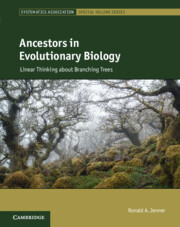Book contents
- Ancestors in Evolutionary Biology
- The Systematics Association Special Volume Series
- Ancestors in Evolutionary Biology
- Copyright page
- Dedication
- Contents
- Acknowledgments
- 1 A History of Narrative Phylogenetics
- 2 From Archetypes to Ancestors
- 3 The Emergence of Lineage Thinking
- 4 Ernst Haeckel’s Evolutionary Storytelling
- 5 The Epistemic Rise of Hypothetical Ancestors
- 6 Intuiting Evolution
- 7 Telling Straight Stories with Fossils
- 8 Seeing Animal Ancestors in Embryos
- 9 Ancestral Attractions and Phylogenetic Folklore
- 10 Narrative Shortcuts and Phylogenetic Faux Pas
- 11 Taxic Distortions of Lineage Thinking
- 12 Making Sense with Stories
- References
- Index
- Systematics Association Special Volumes
10 - Narrative Shortcuts and Phylogenetic Faux Pas
Published online by Cambridge University Press: 08 July 2022
- Ancestors in Evolutionary Biology
- The Systematics Association Special Volume Series
- Ancestors in Evolutionary Biology
- Copyright page
- Dedication
- Contents
- Acknowledgments
- 1 A History of Narrative Phylogenetics
- 2 From Archetypes to Ancestors
- 3 The Emergence of Lineage Thinking
- 4 Ernst Haeckel’s Evolutionary Storytelling
- 5 The Epistemic Rise of Hypothetical Ancestors
- 6 Intuiting Evolution
- 7 Telling Straight Stories with Fossils
- 8 Seeing Animal Ancestors in Embryos
- 9 Ancestral Attractions and Phylogenetic Folklore
- 10 Narrative Shortcuts and Phylogenetic Faux Pas
- 11 Taxic Distortions of Lineage Thinking
- 12 Making Sense with Stories
- References
- Index
- Systematics Association Special Volumes
Summary
In this chapter I show that although hypothetical ancestors largely lost their epistemic power as deliberately constructed phylogenetic tools after the spread of modern phylogenetics, narrative phylogenetic reasoning persists. A conspicuous and widespread example of employing narrative shortcuts in evolutionary storytelling today is the attempt to use the phylogenetic position of taxa to predict the presence of ancestral character states. In close analogy to the historical use of the label ‘lower’ to designate taxa that are presumed primitive, modern authors use a range of evocative adjectives to promote the presumed presence of ancestral character states in their favoured taxa. ‘Basal’ is the most frequently used label, and many authors think that its link to the phylogenetic position of taxa gives it predictive power over whether these are likely to have retained ancestral states. I explain that phylogenetic and evolutionary theory provide no convincing rationale for this argument, and argue instead that basal taxa can be especially misleading about the nature of their character states. Proper lineage thinking can help one avoid this conceptual mistake.
- Type
- Chapter
- Information
- Ancestors in Evolutionary BiologyLinear Thinking about Branching Trees, pp. 282 - 297Publisher: Cambridge University PressPrint publication year: 2022

